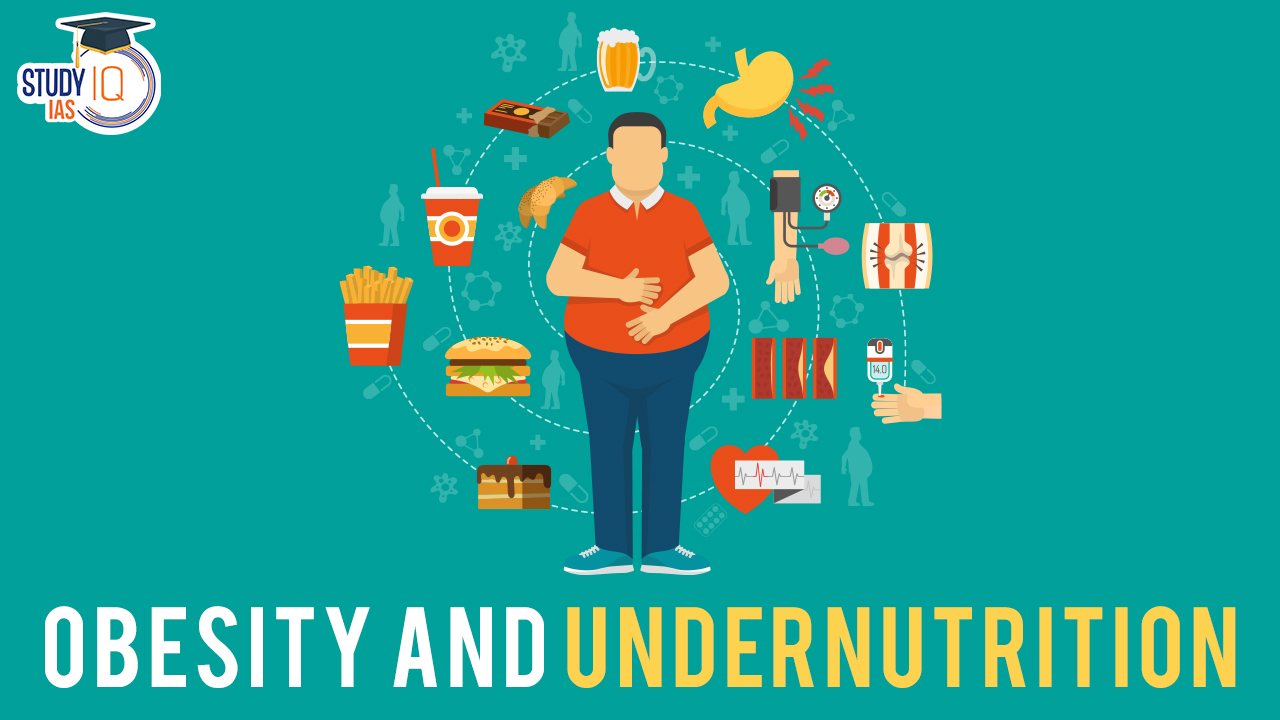Table of Contents
Context: Obesity and overweight are causing over 3.4 million deaths every year worldwide.
Obesity and Undernutrition
- India faces a growing challenge of both obesity and undernutrition, co-existing within the population, as per a new Lancet study.
- This phenomenon, known as the “double burden” of malnutrition, poses significant health risks.
| About Obesity |
|
Parameters of Obesity and Undernutrition
- Obesity: Defined by the World Health Organization (WHO) as an abnormal fat accumulation posing health risks.
- Adults: BMI ≥ 30 kg/m2
- Children/adolescents: BMI two standard deviations above the mean
- Undernutrition: Encompasses various forms, including underweight.
- Adults: BMI < 18 kg/m2
- Children/adolescents: BMI two standard deviations below the mean
Facts about Obesity and Undernutrition
Obesity
- Women: Increased from 1.2% (1990) to 9.8% (2022), with 44 million affected in 2022.
- Men: Increased by 4.9% (1990-2022), with 26 million affected in 2022.
- Children: Significant rise (3% in girls, 3.7% in boys) over 32 years.
- 2022: 3.1% of girls and 3.9% of boys obese (compared to 0.2 million each in 1990; 7.3 million boys and 5.2 million girls in 2022).
Undernutrition
- Despite the decline, prevalence remains high.
- 2022: 13.7% of women and 12.5% of men were underweight.
- Thinness (underweight in children):
- Highest in the world for girls (20.3%) and second highest for boys (21.7%).
We’re now on WhatsApp. Click to Join
Causes of Obesity and Undernutrition
- Lack of access to affordable, nutritious food: Contributes to both undernutrition and obesity.
- Undernutrition: Limited access to food itself.
- Obesity: Increased access to processed, unhealthy foods high in fat, sugar, and salt.
Socio-economic Factors
- Gender: Women have higher obesity rates due to:
- Limited access to physical activity (walks, gyms).
- Prioritising family nutrition over their own.
- Less sleep (waking up early, sleeping late).
- Central obesity (abdominal fat accumulation) might be as high as 40-50% in some regions.
- Income: While traditionally associated with the rich, obesity is rising among the poor due to:
- Affordability and convenience of junk food (e.g., samosas, pakoras) compared to fruits and vegetables.
- Urban-rural divide: Obesity is more prevalent in urban areas.
- Undernutrition: Persists in remote, rural areas of poorer states due to:
- Limited food access, with some people having only one meal a day.
Health Impacts of Obesity and Undernutrition
- Obesity: Increases risk of diabetes, hypertension, heart attacks, and strokes.
- Undernutrition: Increases the risk of non-communicable diseases later in life:
- “Catch-up growth” in adulthood may lead to bodies less able to adjust to increased nutrition, making them more susceptible to diseases like diabetes.
- This phenomenon has been observed in famines, where the rate of diabetes increases significantly years later in those born during the famine.
| Obesity Stats |
|
Solutions for Obesity and Undernutrition
- The study emphasises addressing both obesity and undernutrition simultaneously.
- Focus on programs promoting healthy nutrition:
- Targeted cash transfers.
- Food assistance (subsidies, vouchers for healthy foods).
- Free healthy school meals.
- Primary care-based nutritional interventions.
- Ensure food security.
- Support weight loss for those with obesity: Prevention and management are crucial due to the earlier onset of obesity, leading to longer exposure.
- Making healthy food affordable and accessible is a key challenge.
- Pharmacological treatment: While promising, the study suggests its limited impact due to high costs and lack of generalizable guidelines.


 India’s Deep Sea Technology, Need and ...
India’s Deep Sea Technology, Need and ...
 Nag Anti-Tank Missile System (NAMIS)
Nag Anti-Tank Missile System (NAMIS)
 ESA’s Gaia Mission, Scientific Instrum...
ESA’s Gaia Mission, Scientific Instrum...





















